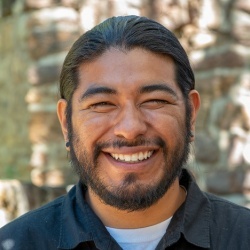The Guatemalan state has historically marginalized and violated the rights of indigenous peoples, thus benefiting the elites that treat the country as their private finca. Today the elites have favored foreign corporations engaging in extractivist industries such as hydroelectric dams and mining. The violence is not limited to one particular community, but affects the entire country and all its indigenous peoples.
The persecution and the violence are increasing, and the attacks against ancestral authorities and community leaders are alarming. According to an Ixil ancestral authority: “When one tries to practice their rights, they are treated as terrorists, delinquents, savages.” Leaders such as Abelino Chub Caal (Q’eqchi’) and Rigoberto Juárez Mateo (Q’anjob’al) were arbitrarily detained for their struggle in protecting their lands against extractivist companies. Others such as Bernardo Caal Xol (Q’eqchi’) have been convicted and continue to be unjustly imprisoned. But some cases are even more tragic, like the one of Daniel Pedro Mateo (Q’anjob’al), who was tortured and assassinated. Entire communities protesting peacefully have suffered from the politics of terror used by the government when it sends in armed forces to carry out displacements or arrest warrants. Some of many examples include La Puya, Santa Cruz Barillas, San Juan Cotzal, San Juan Sacatepéquez, El Estor and the massacre in Alaska, among others. Recently, on April 5, 2019, the Alcaldía Indígena of Nebaj was threatened by a group of protestors who demanded its removal from the office granted to them by the Municipality. The protests became hostile as members of the Alcaldía Indígena received threats of violence and death, with one of the leaders, Ana Laynez, and her daughter being physically assaulted. Those responsible for these attacks usually remain free, symbolizing the harsh level of impunity that characterizes Guatemala’s political and social situation.
[frasepzp1]
The eight-day March for Dignity, Life and Justice was meant to highlight and denounce impunity, corruption, structural inequalities and violence against ancestral authorities and human rights activists. Thousands gathered for the march and expressed discontent with the current Guatemalan government, which has proven to be corrupt, inefficient and a violator of human rights. The state is also responsible for the deaths of those who do not receive proper medical attention and those who die migrating to the US. People migrate, especially the young, because the government has failed to guarantee even the most basic rights for people. It is not surprising that many of the people leaving the country are indigenous.
Indigenous communities and their authorities have existed for centuries and have ancestral rights to territories and natural resources. These rights have been recognized by international institutions and agreements such as the United Nations Declaration on the Rights of Indigenous Peoples and ILO’s Indigenous and Tribal Peoples Convention, 1989. Yet, ancestral authorities continue to be criminalized by a criminal Guatemalan state. Without serious structural changes, these elections represent the selection of new agents of a corrupt and violent government and will not solve the country’s problems. Without respect for indigenous peoples and ancestral authorities, there will be no change in Guatemala.
* * *
Read it in Spanish here.




























Más de este autor